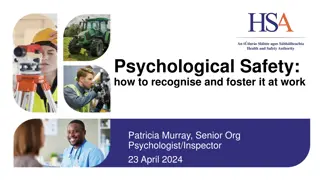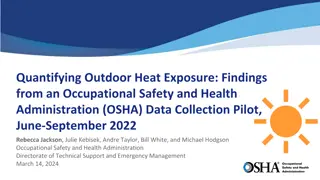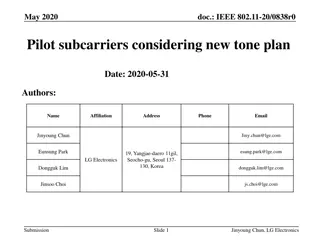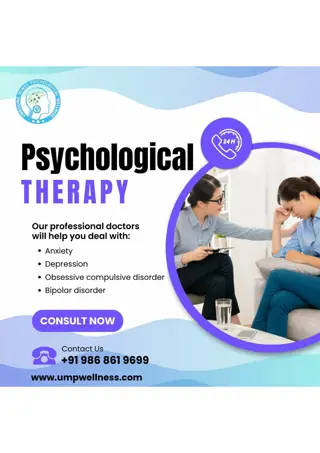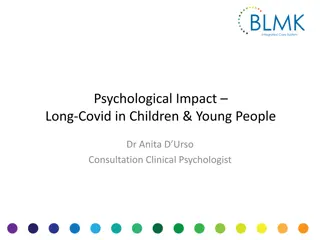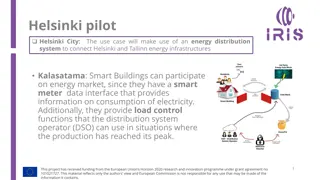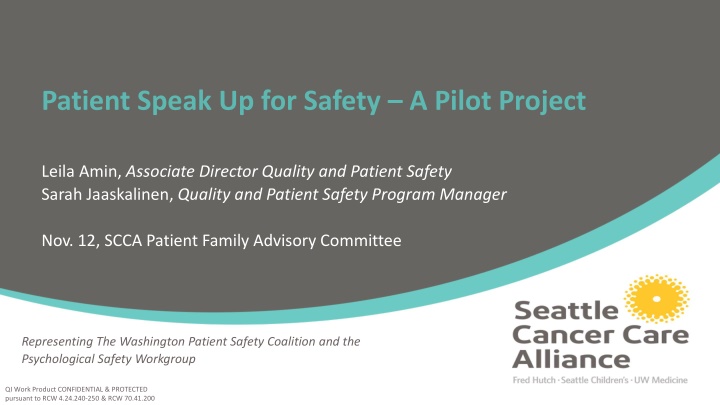
Patient Speak Up for Safety Pilot Project: Enhancing Patient Empowerment
"Explore the Patient Speak Up for Safety Pilot Project focused on empowering patients and families to voice safety concerns in healthcare settings. Learn about addressing concerns, strategies, and the importance of speaking up for safer care environments."
Uploaded on | 2 Views
Download Presentation

Please find below an Image/Link to download the presentation.
The content on the website is provided AS IS for your information and personal use only. It may not be sold, licensed, or shared on other websites without obtaining consent from the author. If you encounter any issues during the download, it is possible that the publisher has removed the file from their server.
You are allowed to download the files provided on this website for personal or commercial use, subject to the condition that they are used lawfully. All files are the property of their respective owners.
The content on the website is provided AS IS for your information and personal use only. It may not be sold, licensed, or shared on other websites without obtaining consent from the author.
E N D
Presentation Transcript
Patient Speak Up for Safety A Pilot Project Leila Amin, Associate Director Quality and Patient Safety Sarah Jaaskalinen, Quality and Patient Safety Program Manager Nov. 12, SCCA Patient Family Advisory Committee Representing The Washington Patient Safety Coalition and the Psychological Safety Workgroup QI Work Product CONFIDENTIAL & PROTECTED pursuant to RCW 4.24.240-250 & RCW 70.41.200
Patient Speak up for Safety Pilot Project Why Now? In light of current world response to the COVID-19 pandemic, it is more important than ever to create an environment where patients and families can participate as a member of the team and confidently speak up and voice safety concerns. Project Goal: This project aims to promote patients and families to feel more empowered to speak up in the health care environment which will ultimately lead to safer care environment and improved patient satisfaction. Today s meeting objective is to obtain your feedback on the following: 1) Implementation of a baseline assessment for how comfortable patients are speaking up for safety 2) Pilot project details for a speak up for safety campaign 2 QI Work Product CONFIDENTIAL & PROTECTED pursuant to RCW 4.24.240-250 & RCW 70.41.200
Potential Concerns with Speaking Up Historically speaking up has not always worked as intended and at times has led to new errors or risk for errors. Patients, and often family members, fear that mentioning a problem will result in retaliation or poor care. Many patients are too ill to seek reporting channels. Others are not convinced that reporting will not matter (Mazor et al., 2016). Wachter (2018) reports, patients can cross the line that separates being empowered and appropriately skeptical from being aggressive and confrontational. The latter attitude may lead providers to adopt a defensive stance or even generate outright avoidance. 3 QI Work Product CONFIDENTIAL & PROTECTED pursuant to RCW 4.24.240-250 & RCW 70.41.200
How can we address those concerns? Providing education to staff to raise awareness of Patient Speak Up for Safety Campaign and provide coaching on how to listen and respond to concerns raised by patients Speaking Up & Listening Skills Strategies for Interprofessional Teams Providing patient education on how to Speak Up for Safety using the same tools and language as staff would use to raise concerns with one another Safety tool education and case examples available on the Patient Safety TogetherNet Page 4 QI Work Product CONFIDENTIAL & PROTECTED pursuant to RCW 4.24.240-250 & RCW 70.41.200
The Joint Commissions Speak Up Campaign Speak up if you have questions or concerns. If you still don t understand, ask again. It s your body and you have a right to know. Pay attention to the care you get. Always make sure you re getting the right treatments and medication by the right healthcare professionals. Don t assume anything. Education yourself about your illness. Learn about the medical tests you get, and your treatment plan. Ask a trusted family member or friend to be your advocate (advisor or supporter). The Joint Commission supports patients in speaking up in all stages of their health care Know what medicines you take and why you take them. Medicine errors are the most common healthcare mistakes. Use a hospital, clinic, surgery center, or other type of healthcare organization that has been carefully checked out. For example, the Joint Commission visits hospital to see if they are meeting Joint commissions quality standards. Participate in all decisions about your treatment. You are the center of the healthcare team. 5 QI Work Product CONFIDENTIAL & PROTECTED pursuant to RCW 4.24.240-250 & RCW 70.41.200
Errors prevented by SCCA patients: [Provided 3 examples of incidents reported in our event reporting database] 6 QI Work Product CONFIDENTIAL & PROTECTED pursuant to RCW 4.24.240-250 & RCW 70.41.200
Project Overview Location: 8 NE: SCCA Hospital beds and UW inpatient beds Pre-Pilot: Simple questionnaire that can be asked by a nurse or provider to patients to determine current comfort level regarding speaking up for their safety. Use assessment findings to tailor project implementation Dissemination of lessons learned, real time quality improvement suggestions and strategies for overcoming barriers Pilot Project: Campaign a tool or tools that patients can utilize to speak up for safety concerns that arise Provide education to healthcare providers on how to receive/respond to feedback 7 QI Work Product CONFIDENTIAL & PROTECTED pursuant to RCW 4.24.240-250 & RCW 70.41.200
One or more possible areas of focus About your care **Hand Hygiene PSN specific topics Medication Specific Errors Chemotherapy administration Research Studies Care coordination Language barriers Health literacy Another topic not listed 8 QI Work Product CONFIDENTIAL & PROTECTED pursuant to RCW 4.24.240-250 & RCW 70.41.200
Request for Feedback How to evaluate baseline readiness for a speak up for safety campaign What are the best questions to ask and how can this be done in the least intrusive way? What are the conditions that you feel would make it easiest to speak up? Focus on patients and their caregivers speaking up? Focusing on one issue or multiple issues? Speaking up should lead to a timely change whenever possible How would you want a provider to respond? How would you want to be provided feedback on a more systemic safety issue that has been raised? How to evaluate success of the pilot? 9 QI Work Product CONFIDENTIAL & PROTECTED pursuant to RCW 4.24.240-250 & RCW 70.41.200
References: https://www.jointcommission.org/en/resources/for-consumers/speak-up-campaigns/ Mazor, Kathleen M., et al. "Speak up! Addressing the paradox plaguing patient- centered care." (2016): 618-619. Okuyama, A., Wagner, C. & Bijnen, B. Speaking up for patient safety by hospital-based health care professionals: a literature review. BMC Health Serv Res 14, 61 (2014). https://doi.org/10.1186/1472-6963-14-61 Wachter, R. M., & Gupta, K. (2018). Understanding patient safety. 10 QI Work Product CONFIDENTIAL & PROTECTED pursuant to RCW 4.24.240-250 & RCW 70.41.200





